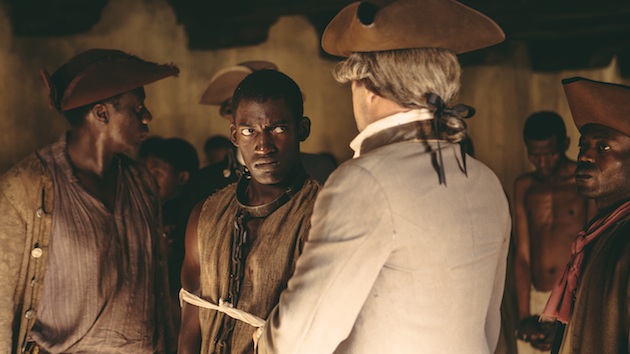Preview: Roots is a Welcome History Lesson

As time passes, it gets easier and easier to forget what a colossal legacy of suffering the practice of slavery inflicted on millions and millions of Africans and African Americans. It has become an abstraction, a concept that we can’t – or don’t care to – fully grasp. When we have people waving Confederate flags and claiming that it has nothing to do with slavery, or that African-Americans need to “get over it,” it’s clear that there are some people out there who could use a little history lesson.
More than 12 million Africans were dragged from their homes and families and loaded onto ships like luggage from the 16th century until slavery was abolished; two million of them died en route. These numbers don’t begin to count the number of people born into slavery, who never knew any other way of life.
And that way of life is the focus of Roots, HISTORY’s new four-night adaptation of the classic Alex Haley novel whose previous 1977 adaptation was the biggest thing ever to hit television at the time. As well-known and highly regarded as the old version is, it is just about as dated as any other 1977 TV program would be to 2016 eyes, and HISTORY has done a spectacular job bringing the story into the 21st century, with much bigger production values and outstanding performances across the board.
Spanning several generations, Roots begins in the late 18th century with young West African Mandinka warrior Kunta Kinte (Malachi Kirby), who is soon abducted and sold into slavery by English traders; we see the harrowing journey across the Atlantic and multiple escape attempts, culminating in the best-known moment of the original series: Kunta’s refusal to answer to Toby, the name his slavemasters have given him, even through a merciless beating.
Through the many indignities he suffers – and there isn’t enough space here to list them all – Kunta holds fast to his identity: Kunta Kinte, Mandinka Warrior. And despite his misgivings about the world he finds himself in, he allows himself to fall in love, to marry, and to have a daughter, who he secretly trains as a Mandinka warrior herself.
Without getting into plot details, suffice it to say that Kunta’s daughter has it a little easier than her father, but only a little, and by a little I mean a barely perceptible amount, and her son has it a little easier than her, but again, only a little.
Through it all, this family manages to hold on to its dignity by holding on to the story of Kunta Kinte, Mandinka Warrior, and passing his traditions – his mother’s favorite song, his tribe’s naming ceremony – all the way down. By the time we see this naming ceremony for the fifth time, as Kunta’s great-great-grandson is held over his father’s head and told to “look at the stars, they are the only thing greater than yourself,” the Civil War has ended, slavery has been abolished, and the former slaves find themselves a little better off than they were before – but just a little.
The suffering is so unrelenting and so painful to watch – in no small part because of how casually it is inflicted by the slavemasters and their women alike – that nearly any measure of happiness, things that we take for granted like a wedding, a first date, a stolen kiss – brings tears to the eyes of any viewer not made of stone.
This is a wonderful, emotional, hugely affecting reimagining of a classic text, thanks in no small part to the performances of Malachi Kirby (Kunta Kinte), Forest Whitaker (as the Fiddler, Kunta’s first mentor after arriving in North Carolina), Anika Noni Rose (as Kunta’s daughter Kizzy), Regé-Jean Page (as Kizzy’s son Chicken George), Jonathan Rhys-Meyers (perfectly cast as loathsome plantation owner and cockfight baron Tom Lea), Chad Coleman (as Mingo, Chicken George’s mentor), Anna Paquin (as undercover abolitionist Nancy Holt), and Laurence Fishburne (as Roots author Alex Haley, who narrates, and, frankly, is a little underutilized).
All of this happened such a long time ago that it’s easy to forget just what an atrocity it was, breaking up families, ruining traditions, and destroying an uncountable number of lives and bodies and spirits. It’s important that we don’t forget, and just as important to recognize what a miracle it is, as bad as race relations continue to be in this country at times, that they aren’t even worse, and how remarkable it is that the victims of this tragic stain on American history have bounced back as quickly as they have.
